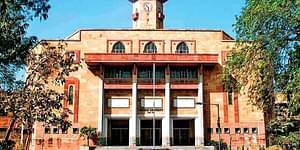BA Rural Development
About B.A. Rural Development
Bachelor of Arts in Rural Development or B.A Rural Development is a three-year undergraduate programme that deals with the studying of possible effective strategies and how they could be implemented to improve the quality of rural economic well-being and life. This three-year undergraduate programme trains the students to become proprietors of changes, mainly in the fields of prosperity, progress and development in the non-urban regions of India.
In rural areas, people require all the basic necessities of life including food, water, educational and medical facilities, hospitals, etc. B.A. Rural Development course shares the knowledge on different ways and methods of rural development especially for these areas. B.A. Rural Development admission is done either on a merit basis or through entrance exam scores. Students after completing their 12th become eligible for the course. B.A. The Rural Development syllabus is divided into 6 semesters. The job opportunities are quite good in this field. If scored well, students can get a chance in the different rural development projects of the Government of India and NGOs. Area Executive, Territory-in-Charge, Agronomist, and District Coordinator are some of the popular career options that can be availed after the B.A. Rural Development courses. A fresh graduate of this field can start a career with an average annual salary of Rs. 2 lakhs which gets increased with time and experience.
B.A. Rural Development Highlights
Mentioned below are the major highlights for the B.A. in Rural Development:
|
Parameters |
Details |
|---|---|
|
Course Name |
B.A. in Rural Development |
|
Full Name |
Bachelor of Arts in Rural Development |
|
Duration |
3 years |
|
Eligibility |
Must have (10+2) qualifications and 50% marks in aggregate |
|
Selection Process |
Entrance/Merit |
|
Exam Type |
Semester-wise |
|
Total Semesters |
6 |
|
Career Options |
Area Executive, Agronomist, Business Development Manager, District Coordinator, etc. |
|
Areas of Work |
Rural Development projects of India, NGOs, etc. |
|
Average Salary |
INR 200,000-INR 800,000 |
B.A. Rural Development Course Benefits
B.A. Rural Development courses have immense benefits. With the knowledge of the course, professionals in this field aid in elevating the economic growth of rural areas. the course teaches them how to improve rural economic lives by implementing modern development methods. The complete rural development knowledge is shared through this course to bring upliftment in the lives of rustic people.
B.A. in Rural Development allows the candidate to improve their organizational skills, understanding of the economy, observation skills, analytical skills, etc. All this expertise can be used for the development of rural areas not only in India but also abroad. Through this course, candidates gain knowledge on the management of the economy also and it helps them to improve the standard of living for rural people. The learning procured from the course can be used in other fields as well. Hence, getting a job after pursuing B.A. Rural Development becomes easy for the candidates.
Who Should Pursue B.A. Rural Development Course?
- Aspiring professionals should be passionate about working in rural areas and making contributions to the development of rural liveD
- Those who want to take part in the economic growth of rural areas can pursue this course.
- Candidates who have social skills, communication skills, and liberal thinking are suitable for the B.A. Rural Development course
- Candidates who have the zeal to work for all communities can be benefited from this course
Table of Contents
B.A. Rural Development Eligibility Criteria
Students who have qualified their 10+2 exam from a recognized Board with a minimum of 50% aggregate are eligible to apply for the B.A Rural Development programme offered by Indian Institutes and Universities. Candidates belonging to backward classes like OBC, SC, ST can apply with a 45% aggregate at the qualifying level examination.
B.A. Rural Development Skills Required
Candidates, if possess the following skills, get immensely benefitted from the B.A. Rural Development programme.
Personal Skills:
Personal skills that are required to have a good grip on the B.A. in Rural Development are as follows:
- Interpersonal Skills
- Communication Skills
- Self-confidence
- Personality Development
Professional Skills:
- Good understanding of Rural Areas
- Observation Skills
- Research Skills
- Presentation Skills
- Teamwork
- Cultural Adaptability
B.A. Rural Development Admission Process
B.A. Rural Development Admission Process is offered in two ways. Some institutes follow merit-based admission and others prefer to conduct entrance tests to select potential candidates.
Merit-Based Admission Process
Colleges or institutes decide on the scores of the last qualifying examination for the selection of the candidates. Those who meet the required scores are offered direct admission.
Entrance-Based Admission
Institute level or national level entrance exams are conducted for the B.A. Rural Development course. The B.A. Rural Development admission is done in the following order:
- Candidates visit the official websites of the desired institutes/colleges
- They register for the entrance exams applicable for the B.A. in Rural Development
- Then they fill up the application form and pay the entrance exam fees through debit/credit or as specified by the university
- On the exam day, candidates appear on the entrance test
- All the qualified candidates for the entrance exams are then asked to attend the interview sessions.
- Based on the performance of the written test and interviews, colleges release a merit list of the candidates
- Those who scored the minimum cut-off marks decided by the institutes are offered final admission
B.A. Rural Development Top Colleges
Major top colleges for B.A. Rural Development is mentioned in the following table:
|
College Name |
Location |
Average Course Fee |
|---|---|---|
|
ST. Xavier’s College |
Mumbai |
Rs. 5,400/- |
|
Institute of Rural Management (IRM) |
Gujarat |
Rs.6,000/- |
|
Hindu College |
New Delhi |
Rs. 9712/- |
|
Institute of Rural Research and Development (IRRD) |
Gurgaon |
Rs. 16,390/- |
|
Kalinga School of Rural Management |
Bhubaneshwar |
Rs. 1246/- |
|
Indian Institute of Rural Management (IIRM) |
New Delhi |
Rs.14,333/- |
|
Presidency University |
Kolkata |
Rs.3,700/- |
|
Ramjas College |
New Delhi |
Rs. 9712/- |
B.A. Rural Development Distance Education
Distance education in B.A. Rural Development is designed to expand rural development activities and awareness. Agricultural extension is another reason for starting distance learning programmes for B.A. Rural Development. The course is suitable for people who work for long hours and can not attend the long-term regular learning programme. As a course, the B.A. Rural Development Distance Education acts as an external motivation for people who are unable to experience regular classes.
Students after qualifying for the 12th exam can apply for the course. They are taught about rural development and social values etc. The course curriculum is generally specified by the university. The objective of this distance education programme is to teach the students about different aspects of rural development so that they can work for the betterment of rural lives. B.A. Rural Development course fees for distance education are quite low. As more students are now showing their interest in rural development activities, the B.A. Rural Development Distance Education is offered through distance learning mode.
B.A. Rural Development Syllabus
S.No |
Particulars |
|---|---|
|
Semester - I |
|
|
Semester - II |
|
|
Semester - III |
|
|
Semester - IV |
|
|
Semester - V |
|
|
Semester - VI |
|
B.A. Rural Development Career Options and Job Prospects
A Rural Development graduate can target either of the following as a potential career -
- Sugar Analyst
- Area Executive
- Agronomist
- Territory In-Charge
- Business Development Manager
B.A. Rural Development Future Scopes
B.A. in Rural Development has become one of the most demanding courses at the undergraduate level. This course has the same demand at the post-graduate level also. However, as India’s rural area is wide, working opportunities are quite good here. A graduate of this field has immense scope for employment. The study of Rural development makes the candidates specialized in the subject and thus increases the chances of getting some lucrative jobs in the field. Advisory, consultancy, management, and research are some of the career options one can choose after the Bachelor of Arts in Rural Development.
After B.A. Rural Development courses, candidates can go for advanced studies in various fields of rural development. A course like a Master’s in Rural Development is available in India. Ranchi University, Mumbai University, Nalanda Open University, etc. offer post-graduation courses in Rural Development. If they want to switch to another field, that option is also available for them. For example, a graduate of B.A. Rural Development can opt for the MBA courses and work in their field of choice.
B.A. Rural Development Employment Areas
In India, Government takes different measures to improve the poor-socio economic conditions of the rural areas. To execute different rural development programmes, qualified professionals are required. Hence, after pursuing B.A. in Rural Development, candidates may have scopes to be employed for different Government programmes:
- National Food for Work Programme
- Sampoorna Grammena Rozgar Yojna
- Swarna Jayanti Gram Swarozgar Yojna
B.A. Rural Development Job Profiles
Multiple job opportunities are there for the graduates of B.A. Rural Development programme. Listed below are key responsibilities of some of the job profiles opted for by the professionals in this field:
Area Executive- The professionals in the role of Area Executive secure financial support for the different programmes. They arrange net income for various rural activities and camps conducted for the development of the rural lives
Agronomist- The key job role of an Agronomist is to work for the improvement of the soil and increase the productivity level. They are liable to assess the nutritional value of crops and improve the quality of seeds. They make various experiments to achieve the target improvement for crops and seeds.
Territory-in-Charge- Territory-in-charge professionals help to increase an organization’s sales force by implementing various sales techniques.
Business Development Manager- Identifying sales leads, introducing new rural development programmes to the clients, providing product and service-related information to new customers, and maintaining good relationships with the clients are some of the key job roles played by a Business Development Manager.
District Coordinator- A District Coordinator work in collaboration with District Government. He ensures that at the district level a synchronized work culture is maintained for the overall development of the district.
Research Officer- A research officer is engaged in different rural research programmes and by doing so he supports the process of rural development.
FAQs about B.A. Rural Development
What are the top colleges offering B.A. Rural Development courses ?
I want admission in B.A. Rural Development. Do I have to clear any exams for that ?
What is the average fee for the course B.A. Rural Development ?
What are the popular specializations related to B.A. Rural Development ?
What is the duration of the course B.A. Rural Development ?
Related Questions
Popular Courses
- Courses
- B.A. Rural Development


















